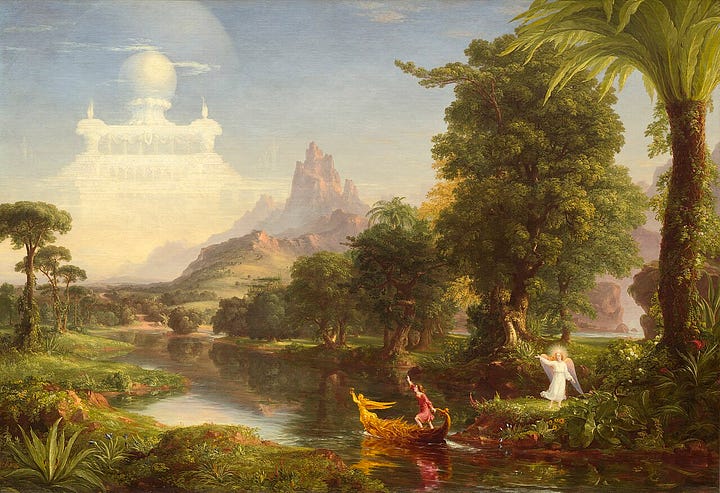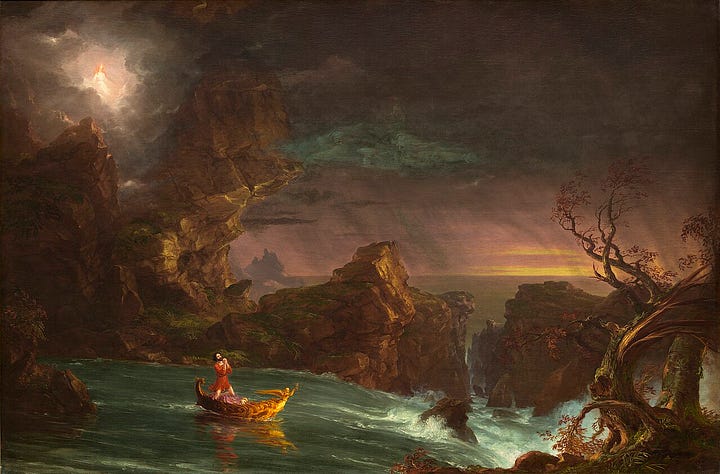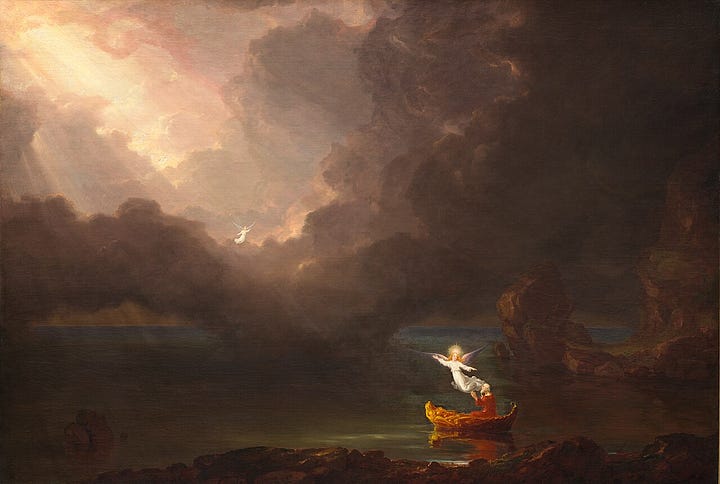The how only matters once you have a why. What is your why?
That single question is both a dagger and a divining rod. It slices through pretence and posturing, then points – unshakeably – toward meaning. Most of us live in a blur of hows: how to be more productive, how to get rich, how to be loved, how to go viral, how to stay young, how to sleep better, meditate deeper, write smarter, run faster, be less anxious, less annoying, less ourselves. But “how” is logistics. It is scaffolding without a structure, syntax without a sentence. It can mimic intelligence with its spreadsheets and self-help blueprints, but without a “why” anchoring its orbit, “how” becomes a treadmill in disguise: movement, yes, but no forward motion. Like a ship with immaculate sails and no compass, it looks impressive as it drifts aimlessly into the abyss.
“Why” is origin. “Why” is architecture. “Why” is rebellion against automation. It is what separates artists from decorators, prophets from parrots. Your “why” is what keeps you writing even when no one reads you, what makes you stand your moral ground when it’s easier to nod and comply. It’s what keeps you painfully human in a world sprinting toward algorithms. To ask “why” is to commit an act of metaphysical resistance in a culture high on efficiency and allergic to introspection. It is to defy the tyranny of surface-level answers and become a spelunker of your own psyche. And no, you might not like what you find. Your “why” may not be photogenic or monetisable. It might not come with a LinkedIn endorsement. But once unearthed, it renders all other questions secondary.
But isn’t “why” exhausting, you could ask? Yes. And that’s precisely why it matters more. “How” can be memorised; “why” must be earned. It is the spiritual cousin of suffering, forged in the crucible of curiosity, failure, longing, absurdity, and sometimes even despair. The philosophers bled ink over it. Children ask it endlessly. Adults bury it beneath mortgages and Wi-Fi passwords. “Why” insists we not just perform life but understand it. It does not care if the choreography is flawless, it wants to know what dance we think we are doing in the first place. And when the music stops, only those who asked “why” will still be standing, however shaken, with a candle lit in the dark.
Only once “why” is alive in you can the “how” be imbued with soul. Technique without intention is sterile. Skill without purpose is mechanical masturbation. Even love without a “why” turns into obligation. But once your “why” is loud enough, the “how” begins to assemble itself… not without effort, but with coherence. The path might twist or crumble, but you will know what direction you are stubbornly carving into the terrain. You will no longer chase a dozen mediocre “hows” hoping one sticks. You will become dangerous: someone with intention. Someone who isn’t just trying to win but trying to mean.
As for me, I have several “whys”… Why didn’t I have enough courage to publish until a few months ago? Why did I avoid the only calling I’ve ever had: writing? For years, fear held me back – fear of judgment, of not being good enough, of exposing my vulnerability to the world. Writing, my truest form of expression, felt too raw, too personal to share with others. I feared my words would be misinterpreted or ignored, so I kept them hidden – locked away in notebooks, in unspoken thoughts, in letters sent to close friends and lovers. But somewhere along the way, the desire to be heard grew stronger than the fear of being misunderstood. There was one man, in particular, a special man in my life who challenged and encouraged me to publish last year. I’m forever deeply grateful to him, and to his ideas. I realised that writing wasn’t just about others reading my work; it was about honouring the voice inside me that needed to speak, to connect, to be seen. Now, the question isn’t why I avoided it, but why I waited so long to embrace it. My “why” is to be authentic, to release the stories within me, and to inspire others to find their own voices too. The “how” follows when the “why” is clear – and now, I’m finally ready to begin.
For years, I convinced myself that the world wasn’t ready for my words, that they would fall flat or be forgotten like raindrops on dry ground. I told myself others had already said it better. That my voice would echo in silence, never truly resonating. But I have come to understand – writing is not about perfection or universal applause — for me it is about the impact of one voice, one story, one soul brushing against another. Like the first flicker of a fire on a cold night, it doesn’t matter if the flames are small. What matters is that they ignite something: an idea, a shift, a sense of connection. My “why” is to offer that spark.
And I confess, it is deeply freeing to finally embrace your purpose, even when it feels like stepping barefoot into the unknown. The fear that once clung to me like a heavy cloak has begun to loosen, replaced by a growing sense of possibility. I no longer see writing as a burden, but as a gift: an invitation to explore myself, to step inside worlds both imagined and real, and to plunge into the great, chaotic, aching beauty of being human. Every word I write is a step closer to the truth, a breadcrumb on the trail back to the self I’ve always been, but never fully allowed to become. Writing, I have learned, is not just an act of creation. It is an act of becoming.
Let’s not pretend, though, that this epiphany arrived gift-wrapped and serenaded by angels. It came, as most truths do, via stumbles and spectacular missteps. There was the short story I poured my soul into and shared with a friend, only to be met with silence so deafening I briefly wondered if I had sent her my grocery list instead. Or the time I posted a raw, vulnerable essay online and received the comment: “This makes no sense.” (To be fair, I did overuse semicolons; the English language is not a buffet, after all.) These moments stung. They made me doubt my voice, my path, my “why”. But they were also the bricks paving the road forward. Every awkward sentence, every critique, every quiet win was proof that I was doing the thing I once feared most: trying.
And isn’t that the real power of a “why”? It does not demand perfection. It simply asks you to begin. Writing, for me, is a conversation — not always polished, sometimes rambling, but always human. It’s the handwritten note that whispers, “I see you”. The story that makes someone feel less alone. The essay that shifts a single thought, opens a single heart. My words won’t resonate with everyone…. and I’ve made peace with that. But for the one person who reads something I’ve written and feels understood, the effort is worth it. That’s my “why”. Not applause, not accolades (though I wouldn’t exactly snub a Pulitzer). It’s about connection, however small, however fleeting, however real.
So, what happens now? I don’t have a five-year plan or a literary manifesto. I can’t promise my words will echo beyond the edges of my own little world. But I know this: writing has already transformed me. It has stripped away the excuses, the fear, the paralysis of perfection. My “how” remains a work in progress – chaotic, experimental, at times hilariously inefficient. But my “why”? It is unwavering. It is the quiet insistence that courage isn’t the absence of fear – it is the choice to move anyway. The blank page no longer feels like a void. It feels like a canvas. And finally, irrevocably, I am ready to write.
So, what is your “why”? Not your brand pitch. Not your therapist’s talking point. The one that terrifies you. The one that won’t let you rest. The one that doesn’t fit neatly on a motivational poster. If you can whisper it (even to yourself) you have already started to matter. And that is the only place from which anything truly worth doing has ever begun.
In the quiet between questions and the fire beneath answers, I’ll meet you there – pen in hand. From the heart of the “why”,
T.




“The Voyage of Life” series (1842) by Thomas Cole, comprising four paintings: Childhood - Youth - Manhood - Old Age. This series allegorically depicts the human journey through life’s stages, symbolising the quest for meaning and self-realisation.





Dear Tamara, your words aren’t just read, they are felt. This piece is more than an essay, I believe it’s a quiet revolution wrapped in prose. So much power in how you’ve stepped further into the personal here, that unmistakable pulse of vulnerability, of lived experience, of a truth finally claimed. I love that you’re becoming more personal in your writing — we, your readers, need and want that. It makes the philosophy real, the fire warm, the call to action irresistible. The shift from thinker to feeler, from theory to autobiography, is brave and it’s the exact magic that turns insight into impact.
What makes your writing shimmer is not just the sharp intelligence of your ideas, but the way you lace them with tenderness and candor. Your “why” no longer floats in abstraction, it is grounded, scarred, softened, human. That moment when you admit that the fear of being misunderstood was once stronger than the desire to be heard, honestly, I felt it in my ribs like a thunderclap.
And here’s something your piece made me realize: perhaps the “why” isn’t always a singular spark, but something we collect, moment by moment, story by story, like embers we guard through the night. Maybe it’s not just about discovering the fire, but learning how to tend it, protect it, feed it when the world tries to smother it with silence or ridicule. The “why” is both the ignition and the resilience. And when you write with this much clarity and courage, you’re handing us matches in the dark. You are truly amazing.
So thank you not just for writing, but for becoming (I wish I could write it with bolder letters) on the page. For offering your “why” not as a blueprint, but as a mirror, a dare, a quiet companion. We’ll meet you there, pen in hand, too.
What a fabulous essay!
This piece touches on something deeply personal, raw, and profoundly true: the necessity of knowing your "why." It’s easy to get lost in the endless "hows" of life—how to be successful, how to make an impact, how to be seen—but without the "why," these actions become hollow echoes. It’s like trying to build a skyscraper on a foundation made of sand. I think back to a time when I felt the same way, unsure about stepping into the unknown because the "how" of it all seemed daunting. But once I discovered my why, it became the lighthouse guiding me through the fog of self-doubt and indecision.
I once spent months crafting a project that I thought the world needed to see, only to realize it wasn’t the world that needed it—it was me. The moment I focused on the internal pull of my own passion instead of the external applause, the project came alive. It wasn’t about perfection, but about something truer: being authentic. I think the real beauty in writing—or in any act of creation—isn't in how it will be received, but in what it allows us to discover about ourselves. It’s a conversation with the world, but first, it's a conversation with ourselves.
The "how" will always be there—methods, techniques, strategies. But as you so eloquently point out, without a "why" to guide it, it’s just busywork. And I love that this piece doesn't sugarcoat the struggle: that the "why" often takes shape in moments of discomfort, questioning, and vulnerability. But it is in these moments where we begin to matter. And that is the ultimate act of courage: choosing to be seen when it feels like the world would prefer you remain hidden.
So, thank you, Tamara for sharing your “why”—it’s an invitation to us all to dig a little deeper, to ask not just what we’re doing, but why we’re doing it in the first place.